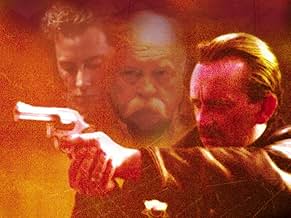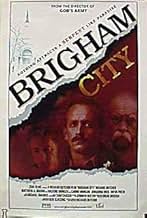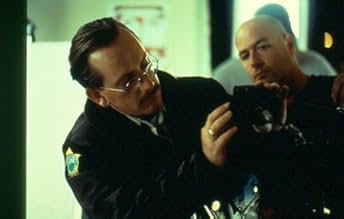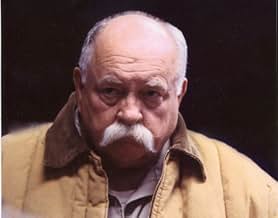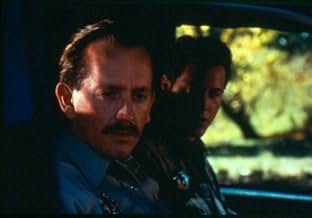IMDb RATING
6.6/10
1.7K
YOUR RATING
The sheriff of a small Utah community searches for a serial killer.The sheriff of a small Utah community searches for a serial killer.The sheriff of a small Utah community searches for a serial killer.
- Awards
- 3 wins total
Wendy Hoop
- April
- (as Wendy Gardiner)
- Director
- Writer
- All cast & crew
- Production, box office & more at IMDbPro
Featured reviews
I live in Mapleton, UT where it was filmed, and am LDS. I enjoyed the movie. If you don't understand the Church's dogma then the end of the movie may not mean that much to you.
I enjoyed the suspense and liked the acting. You can say what you want about the religon and the politics but it's not much different then other places in the world. If you saw the movie Chocolat, you can see the same thing there.
I enjoyed the suspense and liked the acting. You can say what you want about the religon and the politics but it's not much different then other places in the world. If you saw the movie Chocolat, you can see the same thing there.
Having childhoods in the same hometown (Mt. Vernon, IL), Dutcher and I come from completely different worlds as adults. I was impressed with his direction in this film, the tension created and maintained. The characters show a refreshing honesty in looking at where they have been.
The worst thing about going to a mystery movie, is to have the perpetrator revealed too quickly. Brigham City is able to keep its secrets well enough that while you are convinced you know who the guilty party is, you don't find out until the last few moments of the film.
The other engaging aspect of the movie is that it also wisely utilizes both the setting (a small Utah town) and the cultural and religious traditions of the mormon church. Mormons are a group that are often denigrated and little understood by most of American Society. Dutcher is able to successfully integrate Mormon traditions of worship and belief into the plot. While some may find this to be too blatant at times, I think he is able to successfully balance his desire to use this as a backdrop for his murder mystery.
As someone who lived in Utah for about two years, I thought Dutcher was very able to capture many aspects of contemporary Rural Utah/Mormon Culture that are quite unique....so if you would like to understand a little more about mormonism, without inviting the Mormon Missionaries into your home, I think this is a great way to do it, while being entertained at the same time, by a great WHODUNIT plot.
The other engaging aspect of the movie is that it also wisely utilizes both the setting (a small Utah town) and the cultural and religious traditions of the mormon church. Mormons are a group that are often denigrated and little understood by most of American Society. Dutcher is able to successfully integrate Mormon traditions of worship and belief into the plot. While some may find this to be too blatant at times, I think he is able to successfully balance his desire to use this as a backdrop for his murder mystery.
As someone who lived in Utah for about two years, I thought Dutcher was very able to capture many aspects of contemporary Rural Utah/Mormon Culture that are quite unique....so if you would like to understand a little more about mormonism, without inviting the Mormon Missionaries into your home, I think this is a great way to do it, while being entertained at the same time, by a great WHODUNIT plot.
Several days after seeing this movie, I'm still thinking about it. That's about the highest compliment I can pay to a film.
As in all great films, the power of _Brigham City_ lies beneath the surface. The whodunit plot is merely a prop for the exploration of issues that affect us all, especially those of us who claim some sort of religious faith. The age-old question of whether innocence and wisdom can coexist is asked, never answered, and in the end eclipsed by a more pertinent question: If redemption is available for those who have lost their innocence, is it also available for those who fail through lack of wisdom?
As in all great films, the power of _Brigham City_ lies beneath the surface. The whodunit plot is merely a prop for the exploration of issues that affect us all, especially those of us who claim some sort of religious faith. The age-old question of whether innocence and wisdom can coexist is asked, never answered, and in the end eclipsed by a more pertinent question: If redemption is available for those who have lost their innocence, is it also available for those who fail through lack of wisdom?
It would seem that Brigham City has been largely rejected by its target audience -- the Mormons. This surprised me, as I found myself turning its themes over in my mind for a full week after first seeing it.
Granted, it is nothing if not disturbing -- especially to the Mormon subculture which has been so different from mainstream America for so long that it has come to pride itself on its separateness. Yet I found myself deeply moved by the film. It examines with agonizing realism (and sensitivity) a core fear of those with deep religious beliefs: Will my hope survive when God says no to my prayers and allows the world to come flooding in? Am I only in this for the perks, the protection? Will my faith survive pain that seems completely devoid of meaning?
Yet Brigham City's scope is not confined just to the Mormons or just to the religious -- its broader question is whether it is possible to be truly wise while remaining idealistic and innocent. Because of this, the movie seems especially timely and poignant -- both to an increasingly cynical America haunted by its beautiful-but-elusive potential and to a Mormon culture peering warily out at the rapidly growing, international church with its attendant array of alien dangers and trials.
What effect does encroaching despair and disillusionment have on each individual American, Mormon, idealist of any stripe? How much of your innocence and optimism will you have to part with, even in a victory? It's troubling, and no concrete answers are offered, as this is a question that each believer must ultimately answer for himself. I love this movie's balance of honesty and sensitivity, and I hope that Richard Dutcher will not be discouraged by the less-than-warm reception the LDS audiences have given it. We need more movies like this -- and by "we," I mean everyone.
Granted, it is nothing if not disturbing -- especially to the Mormon subculture which has been so different from mainstream America for so long that it has come to pride itself on its separateness. Yet I found myself deeply moved by the film. It examines with agonizing realism (and sensitivity) a core fear of those with deep religious beliefs: Will my hope survive when God says no to my prayers and allows the world to come flooding in? Am I only in this for the perks, the protection? Will my faith survive pain that seems completely devoid of meaning?
Yet Brigham City's scope is not confined just to the Mormons or just to the religious -- its broader question is whether it is possible to be truly wise while remaining idealistic and innocent. Because of this, the movie seems especially timely and poignant -- both to an increasingly cynical America haunted by its beautiful-but-elusive potential and to a Mormon culture peering warily out at the rapidly growing, international church with its attendant array of alien dangers and trials.
What effect does encroaching despair and disillusionment have on each individual American, Mormon, idealist of any stripe? How much of your innocence and optimism will you have to part with, even in a victory? It's troubling, and no concrete answers are offered, as this is a question that each believer must ultimately answer for himself. I love this movie's balance of honesty and sensitivity, and I hope that Richard Dutcher will not be discouraged by the less-than-warm reception the LDS audiences have given it. We need more movies like this -- and by "we," I mean everyone.
Did you know
- TriviaNone of the actors or crew knew whom the real murderer was prior to the last scene being filmed. The actors and crew filming the scene had to sign a contract saying they would not reveal which one of them played the murderer, until after the movie was officially released.
- GoofsAfter Wes deputizes Stu and gives him a badge, Stu doesn't wear it for the rest of the movie.
- SoundtracksBanjo Boy
Written by Ryan Shupe
Performed by Ryan Shupe & the Rubberband
Copyright ©1999 Ryan Shupe (BMI)
Courtesy of Tydal Wave Records
- How long is Brigham City?Powered by Alexa
Details
- Release date
- Country of origin
- Official site
- Language
- Also known as
- Бригам-сити
- Filming locations
- Production company
- See more company credits at IMDbPro
Box office
- Budget
- $1,000,000 (estimated)
- Gross US & Canada
- $852,206
- Opening weekend US & Canada
- $103,629
- Apr 8, 2001
- Gross worldwide
- $852,206
- Runtime
- 1h 59m(119 min)
- Color
- Sound mix
- Aspect ratio
- 1.85 : 1
Contribute to this page
Suggest an edit or add missing content


